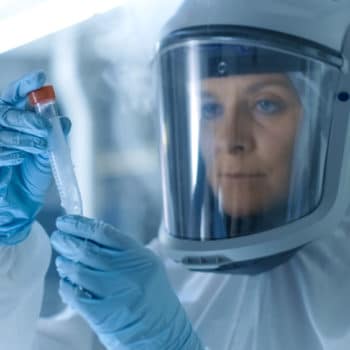Why We Love It
-
$76,230Potential Avg. Salary
-
3.6%Job Growth Rate
-
Growing DemandJob Outlook
-
Dependable Daily WorkloadCareer Attribute
Molecular Biologists research, design and conduct experiments on molecules and cells to understand how the components operate, organize and communicate. The experiments they often preform are DNA sequencing, cloning, RNA functioning and any other cellular behavior.
Recommended Schools
What is a Molecular Biologist?
The following job responsibilities are common for Molecular Biologists:
- Designs, studies and analyzes DNA molecule construction
- Utilizes computer software and other molecular biological techniques to construct molecular modeling and design
- Ensures and maintains quality control and safety standards for the laboratory
- Prepares stains, cultures, solutions and reagents
- Analyzes test results and data and writes reports and papers with findings and then presents the findings
A Day In The Life
Molecular Biologists study and explore the functions of cells on a molecular level. They decipher the complex functions of each component of the biological molecules. Some of these complex molecules they study are DNA, RHA, proteins, lipids and carbohydrates.
They study these biological structures in well-equipped laboratories with advanced technology to explore and build the complex biological structures. The equipment use includes microscopes, infrared lasers, lab centrifuges and advanced computer software.
During their research, they try to isolate and disc over specific patterns in biological materials. They then try to replicate their findings in other experiments to try to prove their created theories and hypothesis. They attempt to isolate, purify and then individually explore a particular cell component.
Typical Work Schedule
This is a 40 hour per week, full-time position. Most of their work is conducted in laboratories or research offices.
Projected Job Growth
The job market for this particular career will surge due to the increase in life span and the increased age of the population will increase demand for medicines and studies regarding chronic diseases.
Typical Employers
Molecular Biologists can conduct academic research or teach at universities or colleges. They can also work for government agencies as consultants, or hospitals and clinics and pharmaceutical companies.
Recommended Schools
How To Become a Molecular Biologist
Those wanting to become a molecular biologist will need to complete a 4 year undergraduate program in molecular biology or mathematics would be sufficient. Laboratory experience is essential and necessary to become a molecular biologist. Common courses for this program are biology, physiology, chemistry, mathematics and genetics. Throughout this program you will be studying biological molecules in humans, plants and animals. They will develop new ways to understand genetic mutation, cell signaling and genetic expression as well as organizing and differentiating cells.
Molecular Biologist Salary Data
We’ve provided you the following to learn more about this career. The salary and growth data on this page comes from recently published Bureau of Labor Statistics data while the recommendations and editorial content are based on our research.
National Anual Salary
Low Range
$48,980Average
$76,230High Range
$125,200National Hourly Wage
Low Range
$24/hrAverage
$37/hrHigh Range
$60/hrHow do Molecular Biologist salaries stack up to other jobs across the country? Based on the latest jobs data nationwide, Molecular Biologist's can make an average annual salary of $76,230, or $37 per hour. On the lower end, they can make $48,980 or $24 per hour, perhaps when just starting out or based on the state you live in.
Salary Rankings And Facts
#162 Nationally for All Careers
Above Average Salary Nationally
Programs and Degrees
Here are the most common degrees for becoming a Molecular Biologist. a is usually recommended and specifically a degree or coursework that prepares you for the particular field, see below.
Highest Education Among Molecular Biologists
- 19.6% Doctorate
- 32% Masters
- 43.8% Bachelors
- 2.2% Associates
- 2.1% College
- 0.2% High School
- 0.1% Less than High School
Job Growth Projections and Forecast
2014 Total Jobs
22,4002024 Est. Jobs
23,200Job Growth Rate
3.6%Est. New Jobs
800How does Molecular Biologist job growth stack up to other jobs across the country? By 2024, there will be a change of 800 jobs for a total of 23,200 people employed in the career nationwide. This is a 3.6% change in growth over the next ten years, giving the career a growth rate nationwide of Above Average.
Growth Rankings And Facts
#497 Nationally for All Careers
Above Avg. Growth Nationally
What Companies Employ The Most Molecular Biologists
| Industry | Current Jobs | New Jobs Needed | % Increase |
|---|---|---|---|
| Research and development in the physical, engineering, and life sciences | 5,400 | 400 | 0% |
| Pharmaceutical and medicine manufacturing | 4,700 | --- | --- |
| Federal government, excluding postal service | 2,600 | -200 | 0% |












